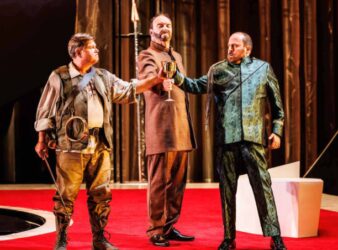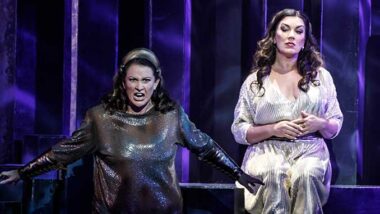 Australia Wagner, Götterdämmerung: Soloists, Chorus and Orchestra of Melbourne Opera / Anthony Negus (conductor). Livestreamed on Australian Digital Concert Hall from the Ulumbarra Theatre, Bendigo, 2.4.2023. (JPr)
Australia Wagner, Götterdämmerung: Soloists, Chorus and Orchestra of Melbourne Opera / Anthony Negus (conductor). Livestreamed on Australian Digital Concert Hall from the Ulumbarra Theatre, Bendigo, 2.4.2023. (JPr)

Production:
Director – Suzanne Chaundy
Set design – Andrew Bailey
Costume designer – Harriet Oxley
Lighting designer – Rob Sowinski
Video designer – Chris Hocking
Cast:
Siegfried – Bradley Daley
Brünnhilde – Antoinette Halloran
Waltraute – Deborah Humble
Gunther – Christopher Hillier
Gutrune – Kerry Gill
Alberich – Simon Meadows
Hagen – Steven Gallop
First Norn – Dimity Shepherd
Second Norn – Jordan Kahler
Third Norn – Eleanor Greenwood
Woglinde – Rebecca Rasheigh
Wellgunde – Naomi Flatman
Flosshilde – Karen Van Spall
I remember reading Götterdämmerung being described as ‘the longest, densest and most musically challenging of the four Ring operas’. In Melbourne Opera’s new Ring cycle, yes, it was the ‘longest’ – just – if still a swift 4¼ hours. ‘Densest’ can be a synonym for obscurest and the story picks up where Siegfried ended and after the three Norns have told us much that we have already seen, we learn how Wotan is resignedly waiting in Valhalla for his ex-Valkyrie daughter and his grandson (!) to bring about the end of the gods and by so doing redeem the world. Brünnhilde – the morning after the night before – sends the rather dim (at least in Suzanne Chaundry’s production) Siegfried off to perform ‘deeds of glory’. However, the forces of evil are still alive and kicking, and the malevolent meddling of Alberich’s son Hagen, desperate to get his own hands on the all-powerful ring, results in bitter betrayal for Siegfried and Brünnhilde. In the Hall of the Gibichungs, Hagen convinces his half-brother, Gunther, to let him drug Siegfried to forget Brünnhilde and marry his sister Gutrune and take a kidnapped Brünnhilde as his bride. At the planned double wedding, Brünnhilde realises she has been betrayed and – in a major plot hole – turns against Siegfried and swears revenge, revealing to Hagen how he can kill Siegfried. After Siegfried has been brutally murdered, Brünnhilde’s final enlightenment leaves her to make the ultimate sacrifice and she rides her horse into his funeral pyre (I’m still waiting to see this staged!), ending the world and bringing about the long-awaited ‘Twilight of the Gods’.
As for ‘musically challenging’ I must praise the Melbourne Opera Orchestra for finally in this cycle reaching the level of orchestral virtuosity their conductor, Anthony Negus, deserved. At times I wish I was listening to it without the words with highlights, such as, the Act I Dawn and Siegfried’s Rhine Journey, the Act III Funeral Music and the final Immolation Scene, providing some lasting musical memories from this Ring cycle.
Sadly, while the music was the best we heard, Chaundry ended her gimmick-free Ring with a perplexing ‘so that’s it, is it?’ Along with her set designer, Andrew Bailey, magical stagecraft conjured up a realistic conflagration of smoke and flames to engulf the dead Siegfried. With two Rhinemaidens swinging back and forth – thanks to aerial artists – on the bendy poles as in Das Rheingold, a third keeps Hagen from reclaiming the ring Brünnhilde has returned to the Rhine: the curtain finally falls with her having committed sati and embracing her husband. This was more Tristan und Isolde than Götterdämmerung. The old order is no more and surely there should be a sense of renewal, and possibly, hope? A clear stage with the sunrising at the back would have done just that.
The Prologue saw the Norns bringing on the rope of fate and attaching it to the basalt columns and under the, similarly familiar, raised platform. They are in gowns which are dark, look velvety and embellished with rope. When the Norns have a vision of how it will all end for the gods the rope breaks and is gathered up as the three wander off arm in arm. Both Siegfried and Brünnhilde look as they did at the end of the previous opera and – with much awkward clambering on the columns, much kissing, and despite an approximate horn call (a rare orchestral blemish on this evening) – Siegfried sets off down the Rhine and the curtain comes down. The Gibichung’s palace has minimal furnishing, gold drapes, two glass cabinets (one for Hagen’s spear), a couple of plain white ottomans, red carpet, with a bare gold tree at the centre and Chris Hocking’s video shows we are on the banks of the Rhine. There are collarless suits for Hagen (brown) and Gunther’s more official-looking, braided green moiré one. In violet, Gutrune is rather dowdy-looking by comparison, but it doesn’t stop the drugged Siegfried making a ridiculous grab for her as soon as he sets eyes on Gutrune. There is too much clambering down from the platform to the front edge of the stage for singers to stand and deliver during this scene here and when we return to the Gibichungs in Act II. After the curtain comes down again, we return to Brünnhilde for her confrontation with her sister Waltraute. As Brünnhilde lies back and looks at the ring Siegfried gave her she couldn’t care less about Wotan’s plight. Waltraute leaves and the flames around Brünnhilde’s rock rise up again with the orchestra proving particularly incandescent too at this point. (Bradley Daley convincingly sings as Gunther who the Tarnhelm disguises him as.) There is quite a struggle for the ring and a hint that Brünnhilde realises it actually is Siegfried.
Threatening skies are the backdrop to Alberich’s confrontation with his son Hagen at the start of the second act. Then with the glow of sunrise Siegfried returns and Hagen rouses his men (and a few women) to welcome Gunther and Brünnhilde. The bereted men, singing out lustily, are in black with spears and swords and basically later just stand about framing all the oath-swearing on Hagen’s spear that we see. (Antoinette Halloran’s Brünnhilde rarely moves from right in front of conductor Anthony Negus.)
At the start of the Act III, it looks like the Die Walküre second act forest and there is the image of flowing water seen at the back. The diaphanously clad Rhinemaidens in their sparkly unitards get teased by Siegfried who later dismisses their warning of his imminent death. Hagen, Gunther and the men who have been hunting rejoin Siegfried and while he is regaling the men (who are lolling around) with his youthful adventures, Hagen puts a potion in the bottle he is drinking from so that he recalls Brünnhilde and his love for her. Hagen’s simple spear thrust has provided the coup de grâce, though Siegfried has time to pick up his sword, wander to the central hole in the stage before collapsing and being left there. Later Siegfried is revealed to Gutrune on a black dais where he will limply raise a left arm which fend Hagen off from getting the ring. Hagen despatches Gunther with a stab in the back before a spotlit Brünnhilde ushers in the end of the opera.

Antoinette Halloran gave an acting masterclass as Brünnhilde even if sometimes she reminded me of a (not-so) silent movie siren at times. Listening through loudspeakers I still heard all the previous positives and negatives I have written about in the earlier reviews. In the middle of her voice – such as when she bid Wotan farewell at the end (‘Ruhe, ruhe, du Gott!’) – there was some wonderfully expressive singing; however, the role has many exacting top notes which now too rarely hit the mark. I don’t know what Bradley Daley sounded like in the Ulumbarra Theatre, but rarely I have seen and heard Siegfried sung with such ease as he does. Nevertheless, I did not like Daley’s unheroic portrayal which overdid the genial, gauche, seemingly mentally challenged, man-child Siegfried. Of those supporting them, the best singing came from the trios of Norns and Rhinemaidens, as well as Deborah Humble’s compelling vignette as Waltraute and Simon Meadows’s well-characterised Alberich. Christopher Hillier and Kerry Hill sang reasonably well whilst their portrayals were rather low-key. Most disappointing for me was Steven Gallop’s Hagen who I thought had neither the voice nor personality for the role. Hagen should be evil-incarnate, yet Gallop made him more of a pantomime villain with his wide-eyed gurning.
Putting on a Ring cycle is a phenomenal achievement of which Melbourne Opera deserves to be rightly proud. Perhaps if it ever gets revived the obvious issues now will be addressed then.
Jim Pritchard
